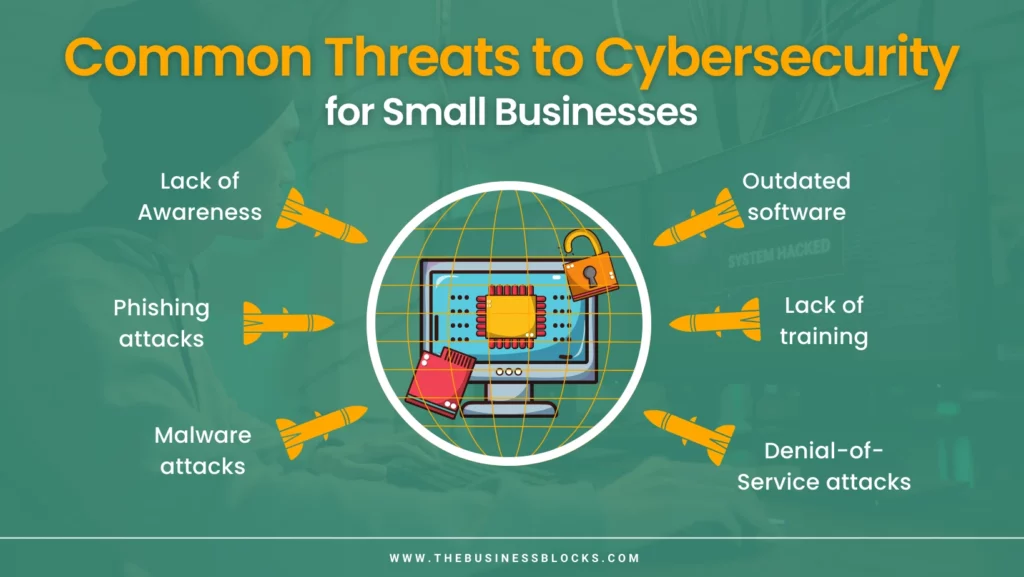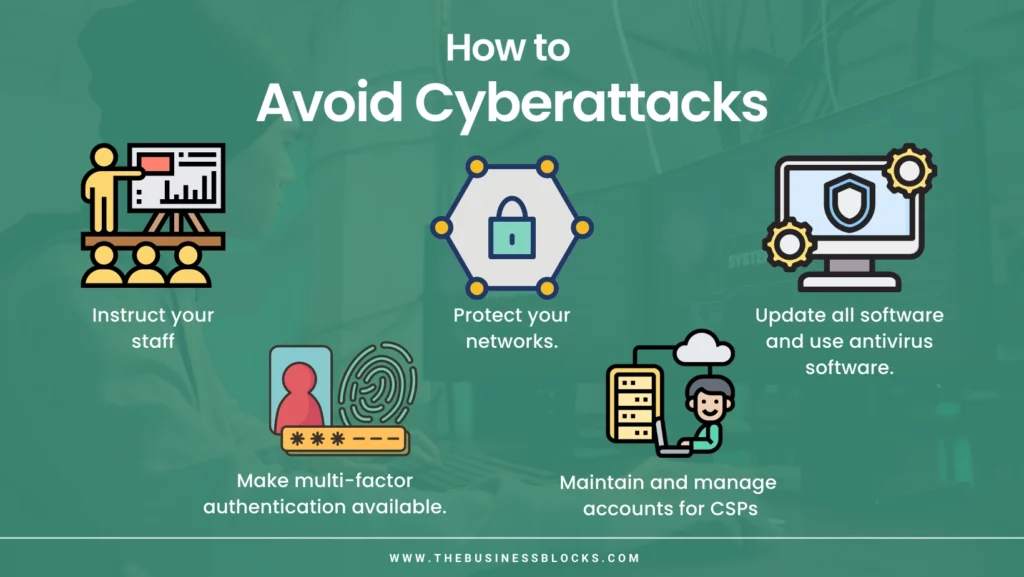Cybersecurity may be unfamiliar and intimidating to a small business owner. You want to defend your company from online attacks, not physical theft, but you might not know where to start, given all the technical aspects involved.
Have you ever wondered what basic steps you need to take to protect your sensitive data from cyber threats?
Understanding the Basics of Cyber Security for Small Businesses is essential to helping small businesses keep their critical data safe. This comprehensive guide covers things such as wireless access points, antivirus software, creating separate user accounts, and multi-factor authentication so that small businesses can better protect themselves from malicious software and cyber attacks.
Learn how easy it is to safeguard your operation with cybersecurity best practices tailored specifically for the needs of a small business. Get up-to-date advice on avoiding becoming an unwitting victim of identity theft or other online crime.
The Significance of CyberSecurity
Cybersecurity issues significantly threaten individuals, businesses, government agencies, and even governments. With the ever-increasing use of technology to store sensitive information, it’s necessary to safeguard against cyber attacks such as data breaches, phishing scams, and malware attacks on mobile devices.
The potential consequences of failing to protect against these threats are severe, including financial loss, reputational damage, and even legal action. As cybercriminals become increasingly sophisticated, it’s essential to stay vigilant and take necessary precautions to prevent being compromised by a data breach.
Cybersecurity Threats for Small Businesses

- Lack of awareness: Many small business owners are unaware of the importance of cybersecurity or the dangers their business faces. As a result, they do not take the necessary steps to protect their and their customer’s data. This can leave them vulnerable to attack.
- Outdated software: Small businesses often do not have the resources to keep their software up-to-date. This can leave them vulnerable to attacks, as outdated software may have security vulnerabilities that hackers can exploit.
- Lack of training: Many small business owners do not have the time or the resources to train their employees on cybersecurity best practices. As a result, their employees may not know how to protect their data or spot a potential security threat.
- Phishing attacks are another common threat that small businesses face. In a phishing attack, hackers send emails or other communications that appear to be from a trusted source to trick victims into revealing sensitive information, such as passwords or credit card numbers. These attacks can be difficult to spot and have devastating consequences for small businesses if successful.
- Malware attacks are another type of attack that small businesses must be aware of. In a malware attack, hackers infect a computer with malicious software, allowing them to access sensitive data or take control of the system entirely. Malware attacks can be particularly damaging for small businesses, as they can lead to data loss or theft and disrupt operations completely.
- Denial-of-service attacks (DoS attacks) are another type of attack that can be devastating for small businesses. In a DoS attack, hackers flood a website or server with traffic to overload it and prevent legitimate users from accessing it. These attacks can cause significant disruptions for small businesses, as they may prevent customers from being able to access their websites or use their services
Cyberattack Prevention Tips

1. Understanding the different types of cyberattacks by training your Employees
Because they have direct access to your networks, employees and their communications connected to their jobs are one of the main causes of data breaches for small firms.
Cyberattacks can be greatly reduced by providing employees with training on fundamental internet usage and practices.
Other subjects for instruction include:
- Detection of phishing emails
- Using responsible Internet usage
- Preventing dubious downloads
- Enabling authentication tools (such as multi-factor authentication, strong passwords, etc.)
- Preserving confidential customer and vendor information.
2. Protecting your network by Installing Security Parameters
You can protect your network by installing and configuring cybersecurity parameters, such as securing your Wireless Access point, firewalls, and antivirus software. Firewalls act as a barrier between your internal data and the Internet, stopping malicious traffic from entering or leaving your system. Wireless Access Points is a hardware device that allows you to set up additional networks in addition to your existing wired network. Antivirus software helps to detect and remove viruses and other malware from your computer.
3. Keeping backups of your Data
It is important to have regular backups of your data in case of a cyber-attack or data breach. Backups should be stored on external hard drives, cloud storage, or other secure media and updated frequently. This way, you can recover your data if it is lost due to an attack.
4. Regularly Monitoring for Security Threats
This can help reduce the risk of cyberattacks by regularly monitoring your networks for security threats. This includes monitoring logins, firewall configurations, email activity, and any other activities that take place on your business’ networks. Keeping an eye out for suspicious activity is a great way to prevent attacks before they occur.
5. Updating all Outdated Software
Ensure that antivirus software is installed on every computer in your company and updated often. Such software is offered by a range of different suppliers online.All software providers routinely release patches and updates for their products to address security flaws, enhance functionality, and install security apps.
All software should be set up to install updates automatically. To secure your business computer’s entire infrastructure, it is essential to update operating systems, web browsers, other apps, and antivirus software.
6. Make Multi-Factor Authentication available.
Multi-Factor Authentication (MFA) is a method for confirming a person’s identification that asks for more information separate user account than simply a standard login and password. MFA often asks for two or more of the following from users: something they are aware of (password, phrase, PIN), something they possess (physical token, phone), and something that physically identifies them (fingerprint, facial recognition).
7. Maintain and manage accounts for Cloud Service Providers (CSPs)
If your business has a hybrid organizational structure, you should consider employing a CSP to host your information, apps, and collaborative services. Data processing can be made more secure through Software-as-a-Service (SaaS) providers for email and office productivity.
By taking the time to educate employees and install security parameters, small businesses can protect themselves from data breaches and other malicious activity. With the right precautions in place, they can ensure that their data remains secure and their networks remain protected.
Benefits of Understanding the Basics of CyberSecurity
- Helps to Keep Your Personal Information Safe – One of the most important benefits of understanding the basics of cybersecurity is that it helps to keep your personal information safe. In today’s world, your personal information is stored online in various places, from social media accounts to online banking.
- Helps to Keep Your Devices Safe – Another benefit of understanding the basics of cybersecurity is that it helps to keep your devices safe. Your devices are increasingly connected to the internet, which makes them vulnerable to attack.
- Helps You to Avoid Phishing Scams – Phishing scams are one of the most common types of cyber attacks, and they can be very difficult to spot if you don’t know what to look for.
- Helps You to Understand Cybersecurity Threats – To protect yourself from cybersecurity threats effectively, it is important first to understand what these threats are and how they work.
- Helps You Stay Up-to-Date on Security Updates -To keep your devices and personal information safe, it is important to stay up-to-date on security updates. Security updates are often released in response to new threats that have been identified.
In a world where cyber threats are ever-present and evolving, Managed Security Services offer a proactive and comprehensive approach to safeguarding your personal information, devices, and digital well-being. With their assistance, you can navigate the digital realm with confidence, knowing that you have a dedicated team of experts working diligently to protect your online assets.
Frequently Ask Questions of Understanding the Basics of Cybersecurity for Small Businesses
Q: What should be done if a data breach occurs?
If a data breach occurs, the first step is to identify the source of the breach and determine what information was accessed or stolen. The next step is to contact law enforcement, notify affected customers and employees, assess any damage that occurred as a result of the breach, and put measures in place to prevent a similar breach from occurring again.
Q: What is the most important thing for a small business to do in regard to cybersecurity?
The most important thing for a small business to do in regard to cybersecurity is to stay educated and aware of the latest threats and trends
Q: What is the best way to detect a cyber attack?
The best way to detect a cyber attack is to monitor your company’s network for suspicious activity. This can include monitoring for unusual traffic, identifying attempts to access sensitive data, and detecting changes in user behavior or system settings.
Final Thoughts
All in all, cyber security is vitally important to small businesses to protect their data and customer information and the reputation of their business. Small business owners should consider implementing basic cyber security measures like multi-factor authentication to protect their online accounts and systems further.
Equipping yourself with up-to-date knowledge about cyber security will help you stay ahead of the curve – and ensure your valuable data stays secure. Investing time and resources into cyber security is a sound decision for small business owners so that those who use services through those businesses have peace of mind knowing that their vital data is being handled safely and securely.

